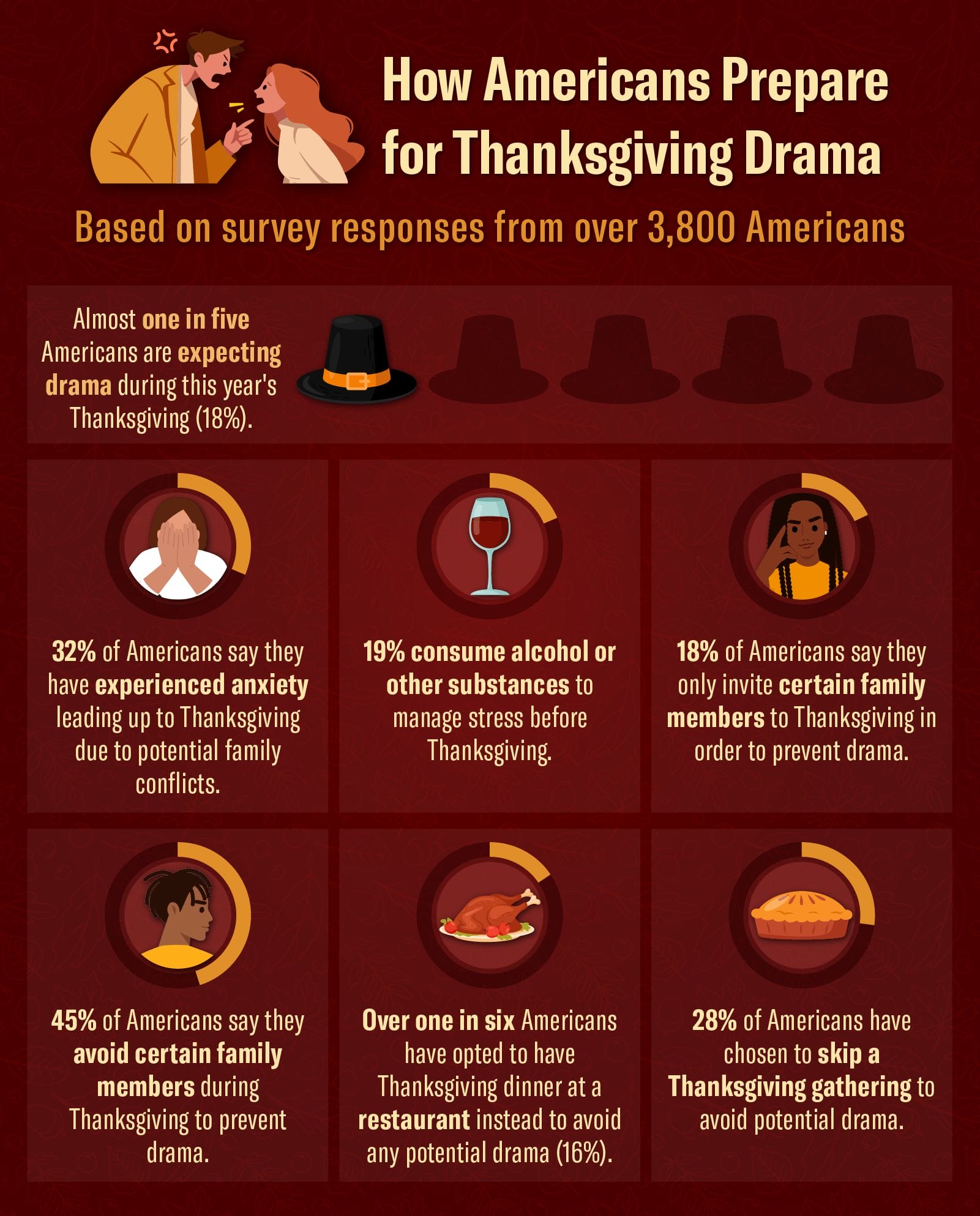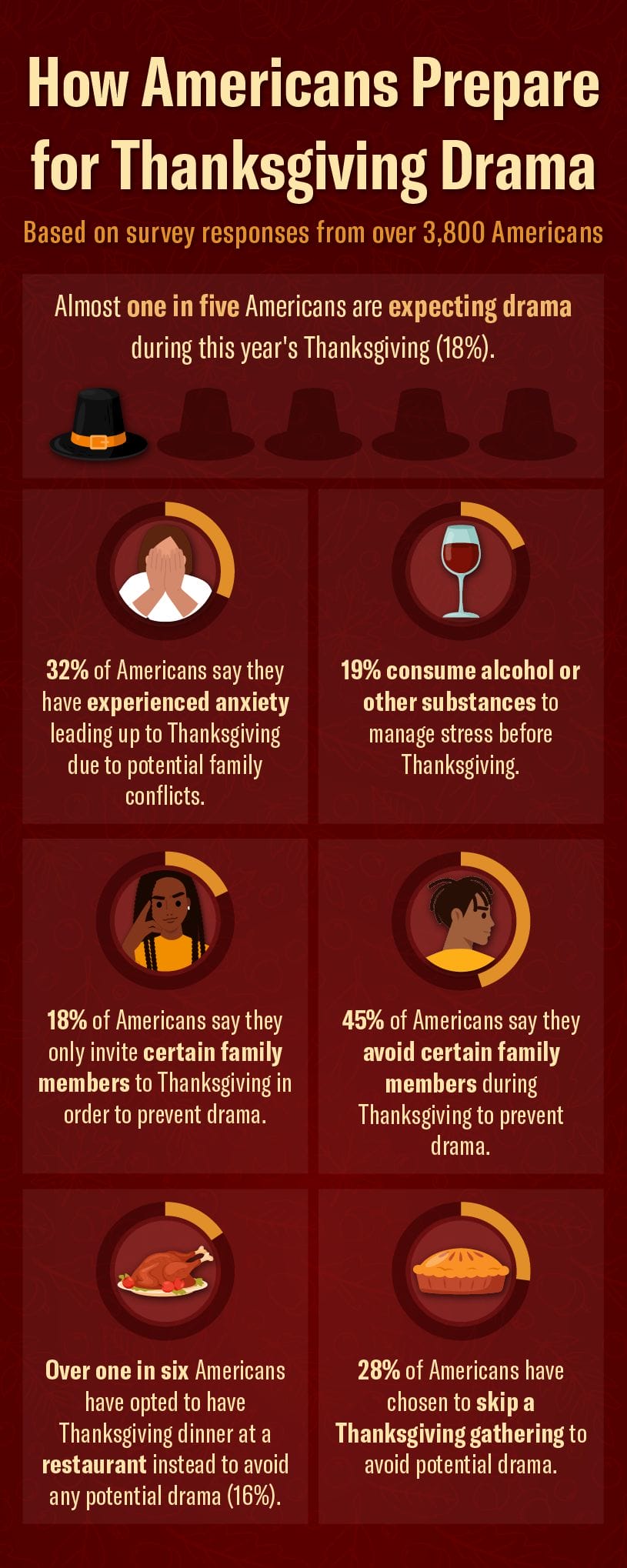Thanksgiving may be a holiday of gratitude and feasting, but for some Americans, it also comes with a side of tension, unexpected twists, and unspoken rules. This year, we surveyed over 3,000 Americans to get a glimpse into what really goes on during Thanksgiving gatherings across the country. For most, the holiday brings joy and togetherness, while for others, it’s a holiday where a bit of strategy can go a long way.
Much like a game where everyone hopes to emerge unscathed, Thanksgiving gatherings require both planning and finesse to sidestep common family pitfalls. As we at BetMGM know, sometimes it’s all about having the right approach and staying calm under pressure. So, whether you’re an active mediator or a silent observer, here’s a look at how Thanksgiving has become its own kind of “high-stakes” holiday experience for some across the country.
Thanksgiving Prep Goes Beyond the Feast for Many


Thanksgiving is a holiday that requires planning and preparation—not just for the meal, but for the family dynamics that come with it. While only 18% of respondents expect drama at this year’s gathering, many still take proactive steps to keep the day running smoothly, with 82% hoping for a peaceful celebration. For those who anticipate potential tensions, a bit of forethought can make all the difference in creating a harmonious holiday.
Anxiety leading up to Thanksgiving is common, with nearly a third of respondents admitting to feeling some level of stress about the holiday. Around 32% say they “never” feel anxious about Thanksgiving, and 38% report “rarely” experiencing any pre-holiday jitters. Yet for others, anxiety looms larger, with 25% feeling it “occasionally” and 7% “frequently.” For these individuals, stress management becomes a part of the holiday prep.
Many Americans lean on coping mechanisms to ease holiday stress. Engaging in physical activities like exercise or walking is a favorite for 28%, while 23% turn to relaxation techniques like meditation or deep breathing. Hobbies or distractions during gatherings help 22% unwind, and 19% use alcohol or other substances to take the edge off. Some even find comfort in talking to a friend or therapist beforehand, which helps 18% of respondents. Still, 46% prefer not to use any support systems at all, indicating a range of approaches to Thanksgiving’s emotional challenges.
To prevent potential conflict, families often set some ground rules. Planning positive activities or establishing an agenda helps 22% of people keep the atmosphere upbeat. Another 18% opt to invite only select family members, while 10% find that setting clear boundaries can help. For 9%, a no-political-talk policy is essential. However, a notable 41% don’t take any specific measures to avoid drama, suggesting that for many, Thanksgiving either isn’t drama-prone or they’re confident in managing it without a plan.
A significant number of Americans (45%) admit to occasionally or regularly avoiding certain family members during Thanksgiving. On the other hand, 55% say they don’t feel the need to steer clear of anyone, indicating that not everyone anticipates conflict. And for some, Thanksgiving requires an entirely different approach: 16% have opted to celebrate at a restaurant instead of at home, finding the neutral setting helps keep things calm. Another 28% have chosen to skip Thanksgiving at least once to avoid drama altogether, with 10% having done so multiple times.
When asked who’s most likely to stir up trouble, respondents pointed to parents (20%), uncles or aunts (19%), and siblings (18%). Grandparents, in contrast, are seen as one of the least likely instigators, with only 6% of respondents identifying them as the source of drama.
Together, these insights reveal a diverse range of experiences and approaches for navigating the Thanksgiving table. While some relish the holiday’s peaceful traditions, others take steps to ensure that gratitude, not grudges, is the focus of the day.
Thanksgiving Table Talk: Why 33% of Americans Brace for Family Tensions


For some Americans, Thanksgiving gatherings can be as much about managing diverse opinions as they are about turkey and stuffing. With family members often holding differing views on important issues, this mix of personalities and perspectives can lead to tension. While 67% of people report feeling comfortable (to some extent) attending Thanksgiving with family members who have opposing opinions, a notable 33% feel some level of discomfort. Women, in particular, report higher levels of unease—40% say they feel uncomfortable in these situations, compared to just 25% of men.
Concerns about political discussions also add to pre-Thanksgiving anxiety. While 71% of respondents are “not concerned at all” or “not very concerned” about politics creating conflict, a notable 29% feel that political talk is a potential flashpoint. Younger generations tend to feel this concern more acutely: 41% of Gen Z and 30% of Millennials are worried about political conflict, compared to just 18% of Baby Boomers, who appear to feel more at ease navigating such topics.
When it comes to handling drama at the table, most Americans prefer to steer clear of conflict. About 29% choose to stay quiet and avoid involvement, while 16% use humor to diffuse the tension. Just 10% take an active approach, attempting to mediate or resolve conflicts.
The emotional impact of holiday drama can also lead people to seek professional guidance. Although only 7% of respondents have turned to therapy to help manage family dynamics during the holidays, another 8% have considered it. This trend points to a growing awareness of the psychological toll family gatherings can sometimes take, especially for younger generations who may be more open to addressing these complexities through counseling.
For some, Thanksgiving drama leaves a lasting mark. While 75% report that holiday conflicts don’t affect long-term family relationships, 25% say drama has led to lasting changes. Generationally, younger respondents seem to be more affected: 31% of Gen Z and 26% of Millennials say Thanksgiving drama has had a long-term impact on their relationships, compared to only 11% of Baby Boomers.
As for the evolving nature of Thanksgiving gatherings, 40% of respondents believe that family drama has increased over the years. While 51% feel that Thanksgiving dynamics have stayed the same, this perception of heightened conflict highlights a shift in how family gatherings are experienced.
When we asked respondents to share which common scenarios have played out at their Thanksgiving gatherings, their answers revealed a spectrum of memorable moments. For 53%, heated arguments have been part of the holiday, while 58% have experienced those classic awkward silences. Uninvited guests have shown up for 21% of respondents, and 47% reported controversial discussions on topics like religion or money. Meanwhile, nearly half (49%) have faced intrusive questions about their personal lives.
These insights show that Thanksgiving can sometimes be a high-wire act, balancing the warmth of family with the weight of sensitive topics. For those who come prepared, Thanksgiving can still be an occasion to enjoy, even if it requires a bit of finesse.
A Look at Thanksgiving Experiences Across Different States
In our quest to uncover how Thanksgiving unfolds across the U.S., we asked respondents from every state* about which common events that can spark up drama have occurred at their family Thanksgiving gatherings. The results reveal a fascinating mix of regional tendencies when it comes to Thanksgiving dynamics, with certain states standing out for having the highest percentage of respondents saying they’ve experienced specific types of holiday tension.
Kansas leads the nation in family arguments, with 72% of respondents saying disputes have gone down at their Thanksgiving gatherings—the highest percentage across all states—while Utah reports the lowest rate, with only 38% saying arguments are a common occurrence. Heated political discussions vary widely by state as well; in Oregon, 58% of respondents have experienced political debates, making it the highest out of the states, while Arizona reports the lowest rate at 20%.
Oregon also ranks highest for surprise announcements (42%), such as engagements or pregnancies, with residents frequently encountering unexpected news at the dinner table. In contrast, Rhode Island had the lowest percentage of these surprise moments, with only 8% of respondents reporting such announcements. When it comes to uncomfortable silences, Oklahoma claims the highest rate in the nation, with 70% of respondents saying they’ve experienced an awkward moment during Thanksgiving, while Connecticut reported the lowest rate at 46%.
Minnesota stands out for discussions around controversial topics like religion and money, with 61% of respondents saying these issues frequently arise, the highest percentage among all states. Meanwhile, Maryland experiences the fewest controversial discussions, with only 31% of respondents encountering them. In Virginia, uninvited guests are a more common occurrence—40% of respondents have had an unexpected arrival—whereas Nebraska has the fewest uninvited guests, with only 8% of respondents reporting this issue.
Some Thanksgiving hosts also deal with no-shows, especially in Kansas, where 60% of respondents say someone invited didn’t attend. Floridians, by comparison, report fewer empty seats, with only 22% mentioning this issue. Complaints about the food vary too, with Rhode Island leading at 45%, the highest rate nationally, while Iowa reports the fewest complaints at only 16%.
Lastly, South Dakota leads in intrusive questions, with 65% of respondents saying they’ve been asked personal questions, such as their relationship status. In contrast, Arizona respondents are the least likely to encounter such prying questions, with only 33% experiencing them.
These insights highlight the diverse ways Americans experience Thanksgiving drama, showing that each state has its own unique flavor of holiday challenges, from heated debates to unwelcome questions.
Closing Thoughts
Thanksgiving brings together families from all backgrounds and beliefs, but as this study reveals, it also brings a unique set of challenges and dynamics that vary across the U.S. Whether it’s navigating family arguments, sidestepping political debates, or handling those infamous awkward silences, Americans approach the holiday with a blend of humor, patience, and, sometimes, a touch of strategy.
At BetMGM Casino, we understand the thrill of anticipating big moments and the strategies needed to make it through—whether that’s a winning hand or a family gathering. This Thanksgiving, consider bringing your own approach to the holiday table, keeping the stakes light and the focus on the joy of being together. And when you’re ready for another kind of excitement, BetMGM has you covered. Join us for some well-earned entertainment, including online casino games and online slots. Remember to use the generous casino welcome bonus if you’re a new player. Happy Thanksgiving from all of us at BetMGM!
Methodology
The data is based on over 3,800 survey respondents. *States not included due to insufficient survey respondents: Alaska, Montana, North Dakota, Wyoming, and Vermont.














